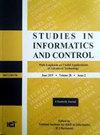Encrypted Data Learning and Prediction Using a BFV-based Cryptographic Convolutional Neural Network
IF 1.1
4区 计算机科学
Q4 AUTOMATION & CONTROL SYSTEMS
引用次数: 0
Abstract
: Machine learning services are widely used for big data, cloud computing, and distributed artificial intelligence applications. Multiple parties participating in the provision of these services may access the users’ sensitive data because most machine learning models use and share plaintext directly. Therefore, it is necessary to utilize cryptographic mechanisms for protecting user privacy. Homomorphic encryption provides an important information security guarantee for machine learning models. However, the complexity of fully homomorphic encryption increases with the depth of neural networks. Especially with the increase in the number of ciphertext multiplications, the time and space costs will also raise exponentially. Using homomorphic encryption in order to protect the model and data security while ensuring the computational efficiency of the employed model over encrypted data is a challenging problem. This paper proposes a BFV-based cryptographic low-latency convolutional neural network (CLOL-CNN) for solving this problem. This new network model performs deep learning and prediction over encrypted data instead of sharing plaintext data. A series of optimization operations are elaborately presented and implemented, such as cryptographic batch normalization, polynomial approximation, cryptographic convolution, and full cryptographic connection. The performance of the proposed model is evaluated with regard to its accuracy and computational overhead obtained by employing deep learning for homomorphically encrypted data. The experiments were conducted on a MNIST image dataset. The obtained results demonstrated that the proposed model has a higher accuracy and a lower time cost than other models and that it is an effective privacy-preserving deep neural network.基于BFV的加密卷积神经网络的加密数据学习与预测
本文章由计算机程序翻译,如有差异,请以英文原文为准。
求助全文
约1分钟内获得全文
求助全文
来源期刊

Studies in Informatics and Control
AUTOMATION & CONTROL SYSTEMS-OPERATIONS RESEARCH & MANAGEMENT SCIENCE
CiteScore
2.70
自引率
25.00%
发文量
34
审稿时长
>12 weeks
期刊介绍:
Studies in Informatics and Control journal provides important perspectives on topics relevant to Information Technology, with an emphasis on useful applications in the most important areas of IT.
This journal is aimed at advanced practitioners and researchers in the field of IT and welcomes original contributions from scholars and professionals worldwide.
SIC is published both in print and online by the National Institute for R&D in Informatics, ICI Bucharest. Abstracts, full text and graphics of all articles in the online version of SIC are identical to the print version of the Journal.
 求助内容:
求助内容: 应助结果提醒方式:
应助结果提醒方式:


